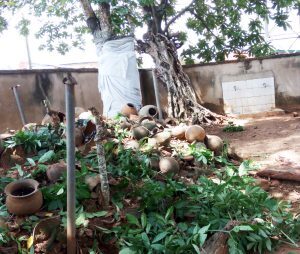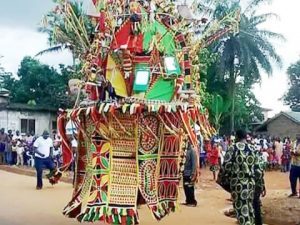By Chinedu Nwaneri, Gabriel Alonta


Imoka is a festival that is highly regarded by Awka indigenes, while dreaded by inhabitants of the capital City. Many have raised eyebrows as to the relevance of the festival which leaves many scarred physically and psychologically. This is more so among those who have had the misfortune of encountering the throngs of youths who crowd the streets brandishing large canes and flogging one another as well as passersby who refuse to part with money on demand. A lot of alcohol and hard drugs are imbibed by these youths publicly and street fights break out from time to time which often results in death or maiming of participants and innocent victims. In fact, it is a truism that no Imoka festival passes by without several records of brutal deaths. As Awka city commences the 2017 edition of ‘Imoka’ festival, Orient Daily engaged the priest in charge of the “Imoka’ deity, Chief Chukwurah Ikegbunam (Eze Imoka) who gave an extensive analysis of the festival, and what is expected during this period, revealing the abuses as well. He advised against extortions and orgies.
Origin of Imoka
The ‘Imoka’ festival is a period in Awka, usually within the 5th month of the year – first month in the Awka native lunar calendar – when indigenes celebrate a deity believed to be the protector and preserver of all Awka indigenes and villages.
The origin of the goddess could be traced back to the days when tribal wars proliferated; a period when villages laid ambush for against others, conquered them and took over their territory.
Awka forefathers contacted a medicine man named Nwunyeokapo, who prepared a very powerful protection charm to preserve the people of Awka from invading belligerent neighbouring or distant towns. This charm is what today is celebrated during the ‘Imoka’ season – to honour the deity for preserving the lives of Awka people.
In those days, medicine men were usually killed after preparing a strong charm for any community. This is to ensure that there won’t be an opportunity for such charm to be prepared for any other, possibly enemy, village. Awka, however, chose to preserve Nwunyeokapo’s life, and allowed him to settle at the present day Okpuno, in Awka.
The deity, who goes by such names as Akaete, AkaeteIyiodo, Iyiapan’akaona-ele, and agboghomalumma Awka ji di ebube, among other names, is perceived as a beautiful maiden in the Awka traditional religion. In fact, to Awka people, it is the most beautiful.
With rising potency of the charm, it earned wide reputation and is expected to be worshipped by Awka indigenes in perpetual appreciation of that gratitude. Indigenes, till date, still recognise it as their preserver and celebrate ‘Imoka’ as the biggest Awka traditional festival to honour the goddess.
Entering the ‘Obu Imoka’, requires purity. People forbidden from entering the Obu include: a female in her menstrual period, anyone who had sexual intercourse, or went to a burial within 24 hours to the scheduled visit.
READ ALSO : Stop Operation Python Dance(2) – Ezeemo to FG
Wanton flogging; rules, abuses
Awka people call it ‘nti agba’, and it is part of the celebration, though guided by rules and regulations. Nti agba is supposed to be done among people of the same age grade and within those rules. These, unfortunately, are often flouted these days.
As far as the individual is from Awka, anybody, who is his age grade can flog him, and give him the cane to retaliate if he chooses. This may continue for three to five rounds as the case may be. If he doesn’t retaliate, it ends there.
On no ground is an indigene of a younger age grade supposed to flog a person from an older age grade. Unfortunately, some revelers these days go to the extent of beating their elders, which is unacceptable, wrong and uncalled for because it is not part of the practice.
For people who understand the real practice, there is no grudge about the flogging; it is even an exciting part of the fun.
Extorting money along the road wrong
Coercing people to part with cash or be flogged is not, in any way, part of the ‘Imoka’ celebration. It is an act of intimidation indulged in by some elements for the sheer purpose of cashing in on the festival to extort innocent money from citizens. It has even been established that many of those involved in the abuse are not Awka indigenes but, given the nature of the festival get away with such.
We have accosted some of them in the past and, on inquiry, discovered that they are non-indigenes. Some probably are those who have spent years in Awka, and are able to speak the dialect, even better than some indigenes.
Ignorant of the reason for the festival and practice, they see the period as one for bacchanal orgy, criminal extortion and crass criminality. They embarrass people; young, old, male and female alike and collect money from motorcyclists.
Many do not even know that it is very wrong to impede the movement of motorcycles carrying female folks, who in every sense, have practically nothing to do with masquerade.
However, we have made serious efforts at stopping these wrong practices by educating our youths on the normal practice, organising meetings involving all the leaders of the 33 villages in Awka where strategies are mapped out to manage the excesses of stubborn individuals. Age grades are also involved to ensure the peaceful and successful observation of ‘Imoka’ festival.
Clashes between Awka and Amawbia
Well, the Amawbia youths, sometime in the past, clashed with our procession on its way to Umuokpu village. I’m happy, however, that that was in the past
and now appreciate that this is our tradition, and that they needn’t impede the procession. Through dialogue, Amawbia has come to understand it that the procession has to go to Umuokpu village, as we usually do, four days to the festival proper. It is now a non-issue.
Awka Traditional Ruler’s role
There are 33 villages in Awka, but an ‘Eze Imoka’ from Amachalla is charged with the responsibility for feeding the Imoka deity, but that doesn’t mean that the traditional ruler won’t play an active role. This is not for just any Awka indigene but the recognised custodian of the culture and tradition of the people.
I won’t say the traditional ruler, which is EzeUzu II has any specific role to play in the celebration. But as the custodian of the culture and tradition of the people, he is supposed to see to the general success of the festival.
The Eze Uzu, by virtue of being recognised by the government as the representative of the people, owes Awka indigenes a duty to present our culture and tradition in good light, attract sponsorship and tourists to grace our traditional festivals and be in full support of traditional activities.
The main issue is that these days we don’t have traditional rulers who understand what it means to uphold the culture and tradition of the land. Most of them face the church and forget entirely that they have norms and values. They totally forget that there are things the tradition requires you to do and not do, by virtue of that office.
It is through the Eze Uzu that the government can be reached to support the festivals like the ‘Imoka’, but if he claims not to be a partaker of tradition, how then can the government place any value on the festival.
By so doing, he has failed in his responsibility as the traditional ruler of Awka. He does not play his role as ‘Eze Omenani’. The church has so hijacked him that he does not show interest at all in observing traditional rites.
The intrusion of the church in traditional matters has affected their attitude towards discharging their role as traditional rulers.
Normally, the government is supposed to allocate some funds to us in support of the festival, but even if they send these things, it would be hijacked from the top because the traditional ruler does not believe or regard traditional activities.
It is, indeed, a shame that Awka’s biggest festival is financed from individual donations raised through a committee. This should not have been so if the traditional ruler had been as active as he is supposed to be.
READ ALSO : Two kidnappers nabbed at Awka in failed operation
Imoka and monkeys
Monkeys, as far as Awka and Imoka is concerned, are treated with high level of respect. Awka, as a community, does not kill or eat monkeys, because of the role they played in Awka many years ago.
In those days, monkeys acted as informants for Awka people. There is a way they would behave, and we will know that there is danger, and begin to act either by consulting the gods, or taking any action that is necessary to resolve the problem.
Charms really exist, but the problem is that some people use it for evil. The truth is if charms are to be developed, Igbos will perform wonders.
There are spiritual rites to be performed if someone kills a monkey in Awka. Anybody that enters Awka must have heard that Awka forbids killing or eating of monkey, but if the person goes ahead to act contrary to the culture and belief of the people, he or she must be ready to face the consequences.
Some people continue to suffer the consequences until they are forced to confess, and fulfill traditional rites that go with the violation.
On untimely deaths during the period
The youth should shun any form of violence, because the festival is not for fighting or causing trouble, but a time for revelry, happiness and peace.
Imoka, from time has been a period of celebration for our forefathers. They enjoyed the period, while playing within the limits of the rules guiding the festival.
The major problem is that the youths neglect the rules, and most painful is that most of those who cause havoc in the guise of Imoka festival are not Awka indigenes. However, there is need to caution everyone that the festival has a procedure.
The youth, especially Igbo youths these days, neglect elderly advice and go about cultural things nonchalantly. The Yoruba and Hausa may go to church to any level but they won’t joke with their culture. We Igbo feel we are too civilized and/or religious for our culture. At the end of the day, we don’t have grip of either religion or our culture; we float in a way that is described as being penny wise, pound foolish.
We should all endeavor to do the right thing, and avoid trouble.
